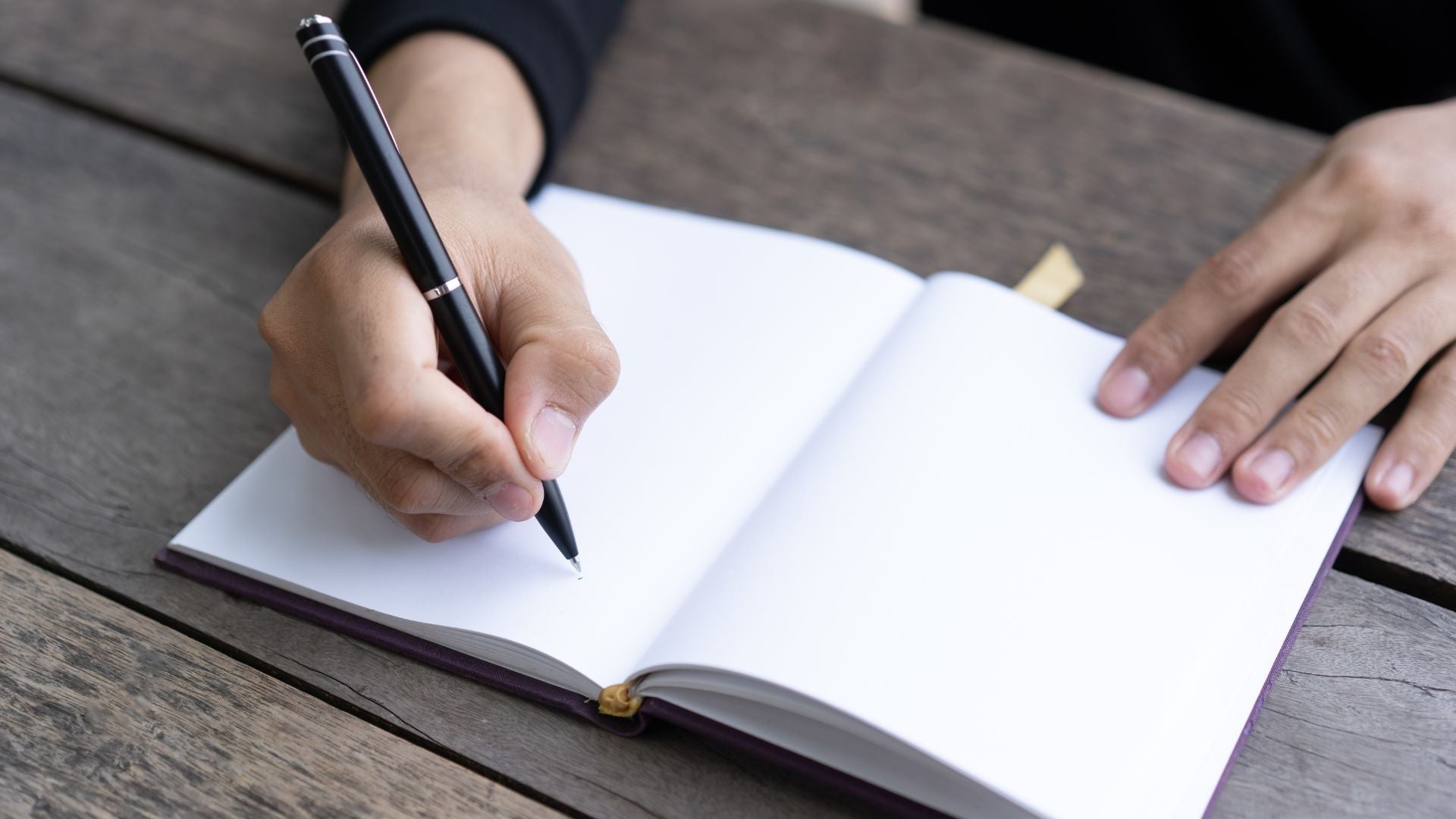Journal Ultimate Guide is needed! SOS! Perhaps the most common question on how to journal is the obvious one: Who needs instructions on how to journal? Just open up to a blank page and start writing!
Indeed, many journaling enthusiasts do exactly that. And to be clear — journaling has no rules. There is no right or wrong way to journal… Or maybe not!
Admit it! It's time for some instructions
Be that as it may, here at Epica, we believe something else: Journaling is so much more than articulating a collection of arbitrary thoughts currently occupying our amygdala. Like a developing bamboo plant! There is a latent and incomprehensible potential to journaling that cannot be experienced by such a rudimentary perception of it. Through our own experience in providing the world with industry-grade handmade leather journals built to last a lifetime, we introduce you to our 8-simple-steps handwriting way
Let’s explore them all!

1) DEFINE YOUR PURPOSE BEFORE START JOURNALING
Individuals journal for a vast array of reasons. Some choose to journal out of boredom and view it as a mode of entertainment. Others may desire to document their thoughts and reflect on them later in life as a fond memory — similar to an old photograph. Several people consider journaling a type of mental exercise, inspiring clarity and critical thinking on pressing issues at the current stage of life they find themselves in. As Newsweek puts it, “journaling forces us to transform the ruminations cluttering our minds into coherent stories”.
Some regard journal writing as a health benefit, citing studies by James W. Pennebaker and Janel D. Segal. They claim, “Writing about important personal experiences emotionally... brings about improvements in mental and physical health”. This is including better stress management, strengthened immune systems and improvement in chronic illnesses such as asthma.
Writing appears to be more than simple catharsis

Oprah Winfrey offers an interesting perspective on why she journals, and why it is so important to her:
“I have been journaling since I was fifteen years old. And after looking back over hundreds of my early entries, the bigger, deeper aha is realizing that words matter. When they are written and not just spoken, words last forever. My journals are a form of therapy for me. Not only as I process and give thanks for what I am experiencing at the moment. But there is a profound sacredness to paging through decades-old entries to rediscover who you are, what you value, and the dreams and goals you cherish. It’s astonishing to be able to track my own evolution.”
There is no definitive, leading reason for one to journal — and yet, the key question remains: why do you seek this discipline? Identifying the underlying reason behind your inclination to the journal will be of great help further along the path when aspiration may begin to dwindle. A defined purpose provides clarity and structure, sustaining motivation when it is most needed. But if you continue to doubt, just read about the benefits of handwriting: 10 amazing truths about writing by hand will blow your mind!
2) GO PHYSICAL OVER DIGITAL

Science is all too clear on this — a traditional custom journal is a far greater preference to a digital notepad because longhand is better than typing. The pen is mightier than the keyboard!
A 2012 study from Indiana University discovered that children were better able to process letters and read successfully through handwriting. Similar research found that when children wrote by hand, they also wrote faster and were able to express more ideas. This suggests there are cognitive benefits to writing by hand, namely, it may help us process and understand concepts better.
In another study on the emotional benefits of writing, UCLA researcher Matthew D. Lieberman told the Guardian that the calming effects of journaling were more effective when subjects wrote by hand. As Yale psychologist Paul Bloom told the New York Times: “With handwriting, the very act of putting it down forces you to focus on what’s important. Maybe it helps you think better.”
If you’re not yet convinced about the benefits of handwriting, these Great Reasons for Keeping a Handwritten Journal have something more to tell you!
Do you know the R.A.S.? What do the studies say`
It seems to be the case that physically writing something triggers the R.A.S. (Reticular Activating System). This system signals the brain to pay extra attention to the task at hand.
A study from 2014 by Pam Mueller and Daniel Oppenheimer suggests people who write out their notes on paper learn more. Writing by hand is slower and more cumbersome than typing, and students cannot possibly write down every word in a lecture. Instead, they listen, digest, and summarize so that they can succinctly capture the essence of the information.
3) INVEST IN A HIGH-QUALITY JOURNAL
When people invest a considerable amount of money into something, they tend to value it more and use it more often. Journals are no exception. A high-quality journal will cost more than the average one you’d find at your local bookstore. But the upfront investment increases your chances of journaling on a more consistent basis and for a longer period — not to mention the longevity you will enjoy with a higher quality journal over one that falls apart much sooner.
Now note this before you start making your handwriting plan; there’s no shortage of high-quality journals available on the market these days. A quick search on Amazon reveals over 9,000 results when queried for a “high-quality journal”. Worse yet, Google finds over a million results for the same query. It inevitably raises the question: How would we narrow down the criteria to ensure we find the best quality journal possible?
ITALIAN LEATHER JOURNALS
If the Swiss are known for their watches, Italians are known for their leather. It’s no secret Italian leather is considered the best quality leather in the world. It is made with tradition and passion. Their finest craft being passed down from generation to generation. Only all-natural vegetable and plant-based extracts are used by craftsmen to manufacture Italian leather. Because it isn’t mass-produced, it takes much longer to make than the cheaper factory-made substitutes.
Italian leather journals are made to last. When compared to other types of leather, Italian is second-to-none. It can withstand everyday wear and tear, with most nicks and scratches being easily wiped away. Any marks on a hide are not actual imperfections – they are instead the result of the natural tanning process which gives it a distinct look.
The best part? Aging only adds to the beauty and uniqueness of Italian leather. It can be easily cleaned and maintained also.
ARCHIVAL-QUALITY PAPER
In a broader sense, archival paper tends to refer to a paper that is “acid-free”. The most common way to make paper was from wood-based pulp that had not had its lignin removed. That makes the paper turn yellow, become brittle, and deteriorate over time. When exposed to light or heat, the molecules in the acidic paper will break down even faster. You can witness these phenomena by looking over old newspapers or books.
Acid-free paper is made using alkaline-paper-making technology. This means the pH of the pulp that is used to form the paper is above 7 (neutral).
The acid-free papermaking process is also significantly more environmentally friendly. The wastewater and byproducts of the papermaking process can be recycled; Energy can also be saved in the drying and refining process, with the alkaline paper is more easily recycled. While certainly not necessary, it is highly recommended to invest in a journal bound by genuine Italian leather. Even better if it's featuring acid-free paper to make it the highest quality journal possible.
4) SET ASIDE A SPECIFIC TIME

There’s no specific time you should set aside for journaling! Oprah articulates it well, noting: “This is what I know to be true: making space in your life for thoughtful reflection and journaling those thoughts is a powerful spiritual practice.” John William Cheever, renowned novelist and short story writer, wrote in the afternoons and often after a drink. Virginia Woolf, on the other hand, wrote many of her entries in the morning. In A Writer’s Diary, she says. “I find it hard to start writing in the morning, but the dejection lasts only 30 minutes, and once I start, I forget all about it.”
Many have identified early-morning journaling to be a superior time to the evenings due to a few reasons.
When you write in the morning, for example, you’re able to impact your mind throughout the day because the day hasn’t even started yet. Also, most people are still sleeping early in the morning. That means you won’t be bombarded with phone calls, emails or texts. There are no distractions to be wary of.
That’s not to say that journaling at night is not beneficial, because it still is and can even be used as preparation for the next day. It may also help your subconscious while sleeping to think of an idea or solution you otherwise may not have considered. Feel free to experiment with both morning and night-time journaling and see what works for you.
5) SET ASIDE A SPECIFIC PLACE

Create your own sacred space. Is it a back porch or a bathtub for you? A window seat or your favorite chair? Being aware of the space that speaks to you is important. Surround yourself in the comfort and resonance that bring you the most joy, open your journal, and begin to express all that you hold within your heart.” — Oprah Winfrey.
Just as important as setting aside time, journaling needs its own dedicated space!
Whether that be in the attic or basement, a space identified with the sole purpose of journaling is ideal. Not only will it help develop your journaling habit. But it will also ensure you don’t get distracted by other activities or people when you are, say, journaling in the kitchen or bedroom. This usually is a recipe for distraction and cluttered thoughts. It is a crucial rule of our guidelines that your journaling space is truly yours. Keep it free from outside influence. Treat it as sacred.
6) FOLLOW A TEMPLATE
Expressing your thoughts haphazardly is one way to journal your way through life. But it’s certainly not the only way. Through science and research, we have developed our 5-step template. Following this tactic, you get the most out of the experience and position yourself for success. It is known as the G.R.E.E.T. method and is summarized as:
STEP1: GOALS – WRITE SYSTEMATICALLY ABOUT THEM
Goals are a milestone we aim to reach some time in the future. Most people do not achieve the goals they set for themselves. This usually happens due to laziness, lack of accountability, or mismanagement of priorities.
Journaling your goals improves your chances of accomplishing them by a large margin. One particular study looked at 149 participants from 6 countries, who worked in various fields. The participants were divided into five groups. Each group asked to go through a different process in setting their goals and working towards them:
1. Simply thinking about their goals.
2. Writing their goals down.
3. Writing their goals down and forming action commitments.
4. Writing their goals down, forming action commitments and sending both to a supportive friend.
5. Same as #4, as well as sending weekly progress reports to a friend.
After 4 weeks the participants rated their progress towards their goals!
Group 5 achieved significantly more than the rest of the groups, with group 4 not far behind. But, surprisingly, group 2 came in third. Simply writing down their goals improved their chances of achieving them by 42%!
Journaling about your goals helps you clarify what you want. Reflecting on goals in writing continually reminds you to take the next action necessary to achieve them. They serve as a tool for identifying what you should prioritize and what you should discard.
Breaking your goals into a yearly, monthly and daily objective encourages small action which compounds and builds momentum. It also helps you understand if you are on track to hit your desired goal by the timeframe set.
STEP2: REFRAME – BE THE CRITIC OF YOURSELF
Evidently, when people journal, they tend to write about the current problems they are facing ― the issues they struggle with and the hardships they are going through. A change of perspective can alter the outcome of any situation. It also helps many people see the positive in an unfortunate or frustrating situation.
In fact, in 2005, the National Science Foundation published an article claiming the average person has about 12,000 to 60,000 thoughts per day. Of those, 80% are negative and 95% are exactly the same repetitive thoughts as the day before.
The rule of 3s may help achieve a change of perspective. To put it simply, write down a problem you are currently facing. Add 3 lines underneath the problem and then write these 3 questions (one per line):
-Will I still have this problem 3 days from now?
-Am I going to have this problem 3 months from now?
-Is there any case that I still have this problem 3 years from now?
In most cases, the answers to the last 2 questions is a resounding ‘No’. With that in mind, would it make any sense to worry about it and let it cause such anxiety and stress? Asking these 3 questions allows us to reframe our problems and cause our perspective to change for the better. Reframing is a powerful technique and a discipline we highly recommend you implement in your daily journaling activity.
STEP3: EDUCATION – ALWAYS KEEP LEARNING

“Once you stop learning, you start dying” ― Albert Einstein
Having an attitude of constant learning means you are never too smart, never an expert and always see what you can discover. This can take the form of looking up a new word in a dictionary, understanding a topic better via encyclopedia, meeting someone new, asking questions to an online community or reading a few pages of a book. Online community Reddit has a popular sub-community known as “Today I Learned”, containing over 20 million users who are actively interested in what others have learned that day while also posting something they recently learned. For example, a recent entry was titled: “Today I learned an optimal nap will last between 20-30 minutes and a perfect nap will last exactly 26 minutes.” Write about something you learned in the past 24 hours you didn’t know prior, no matter how small or insignificant. It will enrich your day and make it all the more gratifying.
STEP4: EMOTION – WRITE TO EXPRESS
Acting on emotions may not be a helpful rule in life but writing on them does seem to be. Journal your current emotions is much more than a tip! Write down exactly how you’re feeling and why you may be feeling that way. It may seem overly simplified, but something profound happens when we do.
As an article in Greater Good Science Magazine states “When we put our thoughts and feelings down on paper, we’re not just transferring them — we’re also transforming them. Writing forces us to arrange our ideas into a sequence, one after another; over time, themes and patterns start to emerge; new insights and perspectives start to bubble up”.
In other words, understanding our emotions and their source is what makes the task so valuable! As it is opposed to merely describing what we’re harboring. In the end, just writing to heal!
STEP5: THANKFULNESS
Journal writing just isn’t complete without a section dedicated to gratitude. There are entire journals that revolve around the theme of gratitude — and for good reason. Listing everything you are thankful for is effective; it enables us to take our eyes off what we don’t have and instead focus on what we do have.
Detailing every favorable circumstance and wonderful person in our lives quickly brings us to this extremely understanding: we have many amazing things that others in less fortunate positions would be extremely grateful to have! Perhaps even exposing ourselves to how we tend to take them for granted.
Begin by being thankful for the ability and opportunity to journal in a safe and comfortable place. Your thoughts will take over from there.
7) BE UNENCUMBERED
Detached from judgment, write as if you have complete freedom with no consequence. Having no filter is a crucial part!
If you can’t be candid in your journal, where can you be free? Allow your most forthright thoughts onto the page. You may come across some internal resistance to this concept, but you must wear it down. Detailing even your darkest secrets should be on the table. It’s the only way to be genuinely authentic.
Write as if no one in the world will ever set their eyes on these pages!
8) REMAIN CONSISTENT

We are all busy people! This is a fact! But journaling is just too important to be an afterthought. Moreover, we have already talked about the 6 Reasons Why People Who Journal On a Daily Basis Are Happier.
Individuals may purport to be “too busy” to journal! But in the same way that meditation advocate and professor at the University of Tennessee, Kenton Yeager claims, “I’m too busy not to meditate”, we can just as well apply that to journaling.
You’re too busy to journal every day? On the contrary — you’re too busy not to journal every day?
Each day is its unique opportunity. Do not let it slip by. With consistency brings rewards. We see that in all aspects of life, journaling being no exception. Unlike homework, it isn’t something you can catch up on when you fall behind.
Do not worry about the duration of each journal entry. Those kinds of metrics are arbitrary. The consistent, daily act of a quick journal entry is a far and away superior method than to journal intensely on a random or intermittent schedule.
At last, as the great philosopher, Aristotle’s put it: “We are what we repeatedly do. Excellence, then, is not an act, but a habit”! Just keep writing without any limitations, and just let the results improve your life.
FINAL (IMPORTANT) WORD
It’s imperative to understand that journaling is not just any ordinary habit, it is a keystone habit. That’s the most important thing that the Journal Ultimate Guide of Epica has to tell you.
Above all, remember this: the number of areas of your life that are impacted after implementing a workout routine — diet, sleep, mood, health — maybe minor changes! But a minor change can trigger so many other positive changes to our lives.








